

Nuclear Proliferation. Energy security. Democracy and Governance (D+G) Human security. International Organizations. Refugees. Environmental. Joseph Nye (SOFT POWER) Policy of deliberate ambiguity. A policy of deliberate ambiguity (also known as a policy of strategic ambiguity) is the practice by a country of being intentionally ambiguous on certain aspects of its foreign policy or whether it possesses certain weapons of mass destruction.
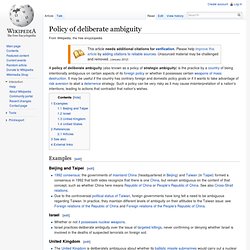
It may be useful if the country has contrary foreign and domestic policy goals or if it wants to take advantage of risk aversion to abet a deterrence strategy. Such a policy can be very risky as it may cause misinterpretation of a nation's intentions, leading to actions that contradict that nation's wishes. Examples[edit] Beijing and Taipei[edit] 1992 consensus: the governments of mainland China (headquartered in Beijing) and Taiwan (in Taipei) formed a consensus in 1992 that both sides recognize that there is one China, but remain ambiguous on the content of that concept, such as whether China here means Republic of China or People's Republic of China. Israel[edit] United Kingdom[edit] United States[edit] References[edit] Joseph Nye. Joseph Samuel Nye, Jr. (born January 19, 1937) is an American political scientist and former Dean of the John F.
Kennedy School of Government at Harvard University. He currently holds the position of University Distinguished Service Professor at Harvard University[1] where he has been a member of the faculty since 1964. He is also the co-founder, along with Robert Keohane, of the international relations theory neoliberalism, developed in their 1977 book Power and Interdependence. Together with Keohane, he developed the concepts of asymmetrical and complex interdependence. The 2011 TRIP survey of over 1700 international relations scholars ranks Joe Nye as the sixth most influential scholar in the field of international relations in the past twenty years.[4] In 2011, he was named by Foreign Policy magazine to its list of top global thinkers.[5] Magazine's valued reporter Daniel Drezner wrote: "All roads to understanding American foreign policy run through Joe Nye.
Master of International Relations by Coursework - Handbook. Course code/s: AMIR Melbourne Enquiries: (03) 9479 2287 The Master of International Relations offers demanding postgraduate study in the important and complex field of international affairs.
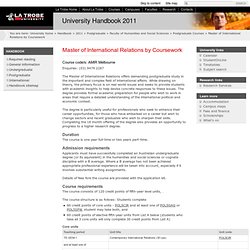
While drawing on theory, the primary focus is on real world issues and seeks to provide students with academic insights to help devise concrete responses to these issues. The degree provides formal academic preparation for people who wish to work in areas that require a detailed understanding of the international political and economic context. The degree is particularly useful for professionals who seek to enhance their career opportunities, for those who have embarked on a career but wish to change sectors and recent graduates who wish to sharpen their skills. Duration The course is one year full-time or two years part-time.
Admission requirements. DFAT Country, economy and regional information. Australia's International Relations - Australian Embassy and Permanent Mission to the United Nations. Austria Information on Australia-Austria Relations Australian Department of Foreign Affairs and Trade information about Australia-Austria: Country Brief and Fact Sheet.
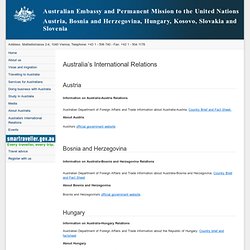
About Austria Austria's official government website. Department of International Relations - Home - IR - ANU. International relations (Wikipedia) The field of international relations dates from the time of the Greek historian Thucydides.
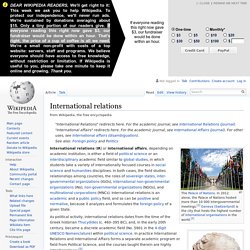
As political activity, international relations dates from the time of the Greek historian Thucydides (c. 460–395 BC), and, in the early 20th century, became a discrete academic field (No. 5901 in the 4-digit UNESCO Nomenclature) within political science. In practice International Relations and International Affairs forms a separate academic program or field from Political Science, and the courses taught therein are highly interdisciplinary.[3] For example, international relations draws from the fields of: technology and engineering, economics, history, and international law, philosophy, geography, social work, sociology, anthropology, criminology, psychology, gender studies, cultural studies, culturology, diplomacy.
History[edit] The centuries of roughly 1500 to 1789 saw the rise of the independent, sovereign states, the institutionalization of diplomacy and armies. Essays - Global Culture. A global culture can be seen in one of two ways.
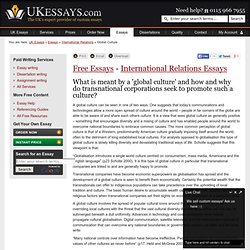
One suggests that today’s communications and technologies allow a more open spread of culture around the world – people in far corners of the globe are able to be aware of and share each others culture. It is a view that sees global culture as generally positive – something that encourages diversity and a mixing of culture and has enabled people around the world to overcome national boundaries to embrace common causes. The more common perception of global culture is that of a Western, predominantly American culture gradually imposing itself around the world, often to the detriment of long established local cultures. For analysts opposed to globalisation this type of global culture is slowly killing diversity and devastating traditional ways of life. Scholte suggests that this viewpoint is that: “Globalisation introduces a single world culture centred on consumerism, mass media, Americana and the English language” (p23 Scholte 2000).
Home - International Relations.
The United States. BRICS. Asian world.